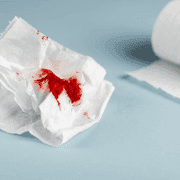Preventing Piles Recurrence After Surgery
In This Article
Preventing Piles Recurrence After Surgery
Elena
Updated on October 17, 2024
Medically verified by Dr. Arya
Fact checked by Dr. Fazeela

Proctology
6 min read
Piles, also known as hemorrhoids, are swollen veins in the lower rectum or anus, which can cause discomfort, bleeding, and itching.
Surgery is often necessary when piles become severe and do not respond to non-invasive treatments.
While surgery can provide relief, there is always a chance of recurrence if proper care is not taken afterward.
Preventing piles after surgery requires long-term lifestyle changes and awareness of habits that can contribute to their return.
In this blog, Mykare Health will explore the best long-term strategies to avoid the recurrence of piles and promote better digestive health, including dietary adjustments, exercise, and personal care.
Understanding Piles Recurrence
Even after a successful surgery, piles can return due to factors like chronic constipation, prolonged sitting, and a poor diet. Post-surgery care is vital for healing and preventing complications. Once you have undergone piles surgery, the goal is to make permanent lifestyle changes to reduce the risk of recurrence.
Let’s discuss some long-term tips for avoiding the return of piles after surgery.
1. Maintain a High-Fiber Diet
One of the most crucial steps in preventing piles is maintaining a diet rich in fiber. Fiber helps soften the stool and makes it easier to pass, reducing the risk of straining during bowel movements. Constipation and hard stools are the primary causes of piles recurrence.
-
Eat more fruits and vegetables: Include fiber-rich fruits like apples, pears, and berries in your diet. Vegetables like spinach, broccoli, and carrots are also excellent sources of fiber.
-
Whole grains and legumes: Replace refined grains with whole grains such as brown rice, oats, and whole wheat bread. Legumes like beans, lentils, and chickpeas are also fiber-rich options.
2. Stay Hydrated
Drinking plenty of water is essential for maintaining smooth digestion and preventing constipation. When you are dehydrated, your body absorbs water from the stool, making it harder to pass. This leads to straining during bowel movements, which can cause piles to return.
-
Aim for 8-10 glasses of water per day: Keep track of your water intake and increase it during hot weather or physical activity.
-
Limit caffeine and alcohol: These can dehydrate your body and contribute to constipation, so consume them in moderation.
3. Avoid Straining During Bowel Movements
Straining during bowel movements puts pressure on the veins in the lower rectum, which can lead to the recurrence of piles. To avoid this
-
Don’t delay bathroom visits: When you feel the urge to have a bowel movement, go immediately. Delaying it can cause stool to harden, making it more difficult to pass.
-
Use a squat position: A squatting position during bowel movements reduces pressure on the rectum. You can use a small stool under your feet to achieve this position while sitting on the toilet.
4. Exercise Regularly
Physical activity promotes healthy digestion and prevents constipation. It also improves circulation and reduces pressure on the veins around the rectum, which can help prevent the recurrence of piles.
-
Engage in moderate exercises: Walking, swimming, and yoga are excellent low-impact exercises that can keep your digestive system active and reduce the risk of piles.
-
Avoid heavy lifting: Straining during heavy lifting can increase pressure on the rectal veins, so be cautious with intense physical activity, especially after surgery.
5. Manage Your Weight
Obesity is a risk factor for piles because excess weight can put pressure on the veins in your lower rectum. Managing your weight through a balanced diet and regular exercise is key to preventing the recurrence of piles.
-
Monitor your calorie intake: Eating a balanced diet with appropriate portion sizes can help you maintain a healthy weight.
-
Combine cardio and strength training: A combination of aerobic exercises and strength training can effectively manage body weight and improve overall health.
 5 min read
5 min readDon't Ignore Bummy Pain: Could It Be Piles?
 7 min read
7 min readBlood In The Stool: A Sign You Shouldn’t Ignore
 6 min read
6 min readSitting All Day Wreaking Havoc? It Might Be Piles!
Get a Callback Now
6. Establish a Regular Bowel Routine
A regular bowel routine helps prevent constipation and the associated straining that can lead to piles recurrence.
-
Stick to a schedule: Try to have bowel movements at the same time each day. This trains your digestive system to be more regular.
-
Relax and take your time: Avoid rushing during bathroom visits, as this can cause straining. Give yourself enough time for a comfortable bowel movement.
7. Keep the Anal Area Clean
Proper hygiene is crucial for preventing infections and irritation after piles surgery. Keeping the anal area clean and dry can also reduce the chances of recurrence.
-
Use soft toilet paper or wipes: Harsh or rough toilet paper can irritate the area, so opt for soft, unscented toilet paper or wipes.
-
Consider a sitz bath: A sitz bath involves soaking the anal area in warm water for 10-15 minutes, which can promote healing and reduce discomfort after surgery.
8. Avoid Prolonged Sitting
Sitting for extended periods, especially on the toilet, can put pressure on the rectal veins and increase the risk of piles returning.
-
Take breaks to stand or walk: If your job involves prolonged sitting, take short breaks to stand up, walk, or stretch. This improves blood circulation and reduces pressure on the rectum.
-
Limit toilet sitting time: Spending too much time on the toilet, even without straining, can worsen piles. Try not to linger on the toilet longer than necessary.
9. Manage Stress
Chronic stress can affect your digestive health and contribute to problems like constipation, which increases the risk of piles recurrence.
-
Practice relaxation techniques: Activities like deep breathing, meditation, or yoga can help manage stress and promote digestive health.
-
Get enough sleep: Adequate sleep is essential for overall health and can help regulate your digestive system.
10. Follow Your Doctor’s Instructions
Finally, always follow the advice of your doctor or surgeon regarding post-surgery care. They will provide you with specific instructions on how to care for the surgical site, diet recommendations, and any medications you may need to take.
-
Attend follow-up appointments: Regular check-ups after surgery ensure that you are healing properly and reduce the risk of complications.
-
Ask for guidance when needed: If you have any concerns or notice symptoms of piles returning, consult your doctor promptly for advice.
Conclusion
Piles surgery can provide relief from painful symptoms, but preventing their recurrence requires a commitment to long-term lifestyle changes. By following these tips, you can significantly reduce your risk of piles returning after surgery. A fiber-rich diet, regular exercise, proper hydration, and attention to bowel habits are key factors in maintaining digestive health and avoiding the recurrence of piles.
Maintain a High-Fiber Diet: Eating fiber-rich foods like fruits, vegetables, and whole grains helps prevent constipation and straining.
Stay Hydrated: Drinking enough water daily softens the stool and promotes regular bowel movements.
Avoid Straining: Go to the bathroom when needed and avoid straining during bowel movements.
Exercise Regularly: Regular physical activity helps with digestion and reduces pressure on the rectal veins.
Manage Your Weight: Maintaining a healthy weight reduces pressure on the veins in the lower rectum.
Establish a Bowel Routine: Stick to a regular schedule for bowel movements to prevent constipation.
Practice Good Hygiene: Keep the anal area clean and dry, and consider sitz baths to soothe discomfort.
Limit Sitting Time: Avoid sitting for long periods, particularly on the toilet, to prevent pressure on the veins.
Manage Stress: Use relaxation techniques and get enough sleep to support your digestive health.
Follow Medical Advice: Stick to your doctor’s recommendations and attend follow-up appointments after surgery.
Source Links
Mayo Clinic



